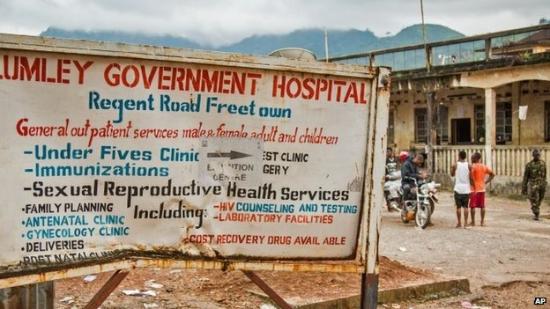You are here
BBC Dec. 22 2014
Spending cuts imposed by the International Monetary Fund (IMF) may have contributed to the rapid spread of Ebola in three West African states, UK-based researchers say.

Sierra Leone, along with Liberia and Guinea, have poor health facilities
It had led to "under-funded, insufficiently staffed, and poorly prepared health systems" in Sierra Leone, Liberia and Guinea, they said.
The IMF denied the allegation.
"A major reason why the Ebola outbreak spread so rapidly was the weakness of healthcare systems in the region, and it would be unfortunate if underlying causes were overlooked," said Cambridge University sociologist and lead study author Alexander Kentikelenis....
The IMF said in a statement that health spending in Guinea, Liberia and Sierra Leone had, in fact, increased in the 2010-2013 period.
It was "completely untrue" that IMF policies had caused Ebola to spread, a spokesman is quoted by AFP news agency as saying....
Read complete story.
http://www.bbc.com/news/world-africa-30575375



Comments
The International Monetary Fund and the Ebola Outbreak
thelancet.com - The Lancet Global Health - Published online: December 21, 2014
DOI: http://dx.doi.org/10.1016/S2214-109X(14)70377-8
In recent months, the International Monetary Fund (IMF) has announced US$430 million of funding to fight Ebola in Sierra Leone, Guinea, and Liberia.1 By making these funds available, the IMF aims to become part of the solution to the crisis, even if this involves a departure from its usual approach. As IMF Director Christine Lagarde said at a meeting on the outbreak, “It is good to increase the fiscal deficit when it's a matter of curing the people, of taking the precautions to actually try to contain the disease.
IMF Response to The Lancet article
imf.org - December 22, 2014
Submitted for publication to "The Lancet" journal
Dear Sir,
There are several factual inaccuracies in your article “The International Monetary Fund and the Ebola Outbreak.”
First, it is not correct to say that health care expenditures declined in these countries. As my colleagues, Benedict Clements, and Masahiro Nozaki, and I note in a recent blog, spending on health and education have increased faster in low-income countries with IMF-supported programs, than those without.
CLICK HERE - IMF Response to The Lancet article on "The International Monetary Fund and the Ebola Outbreak"